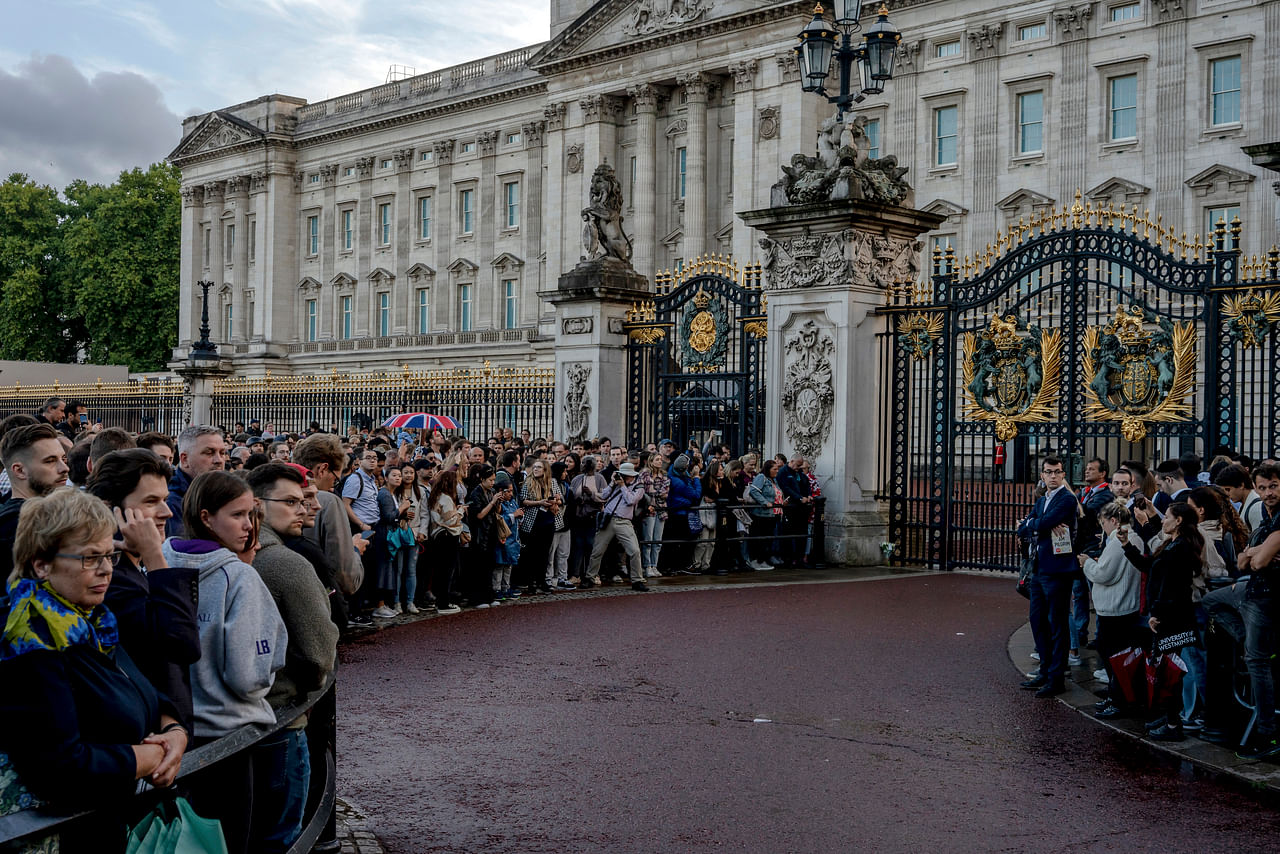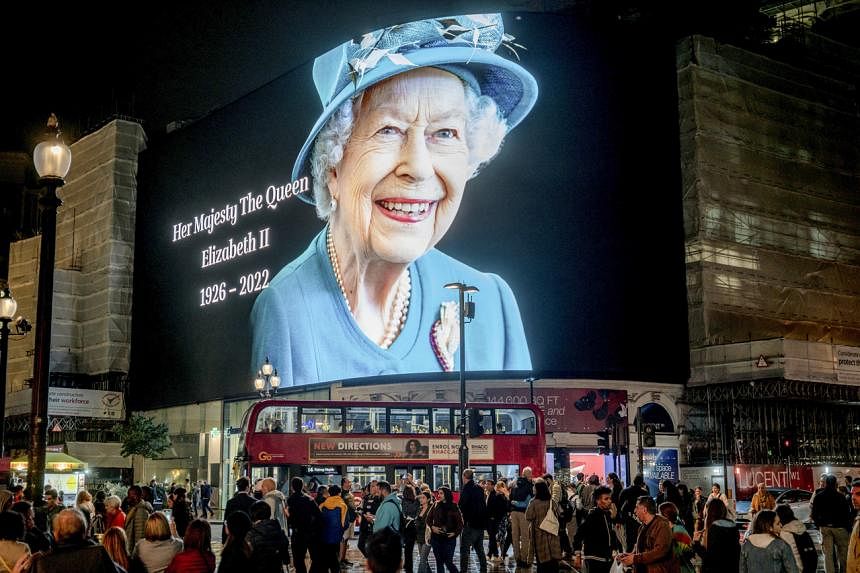LONDON - Queen Elizabeth, whose seven-decade reign made her the only sovereign that most Britons had ever known, died Thursday at her summer estate in Scotland, thrusting a bereaved country into a momentous transition at a time of political and economic upheaval.
The Queen's death at Balmoral Castle, announced by Buckingham Palace at 6.30pm (1.30am, Friday in Singapore), elevated her eldest son and heir, Prince Charles, to the throne. He is Britain's first king since 1952, taking the name King Charles III.
At 96, visibly frail, and having survived multiple health scares, the Queen had been in the twilight of her reign for some years. But news of her death still landed with a thunderclap across the British realm, where the Queen was a revered figure and an anchor of stability.
In itself, the Queen's death is a watershed moment. But it also comes at a time of acute uncertainty in Britain.
A new prime minister, Ms Liz Truss, has been in office for only three days, following months of political turmoil in the British government.
The country faces its gravest economic threats in a generation, besieged by inflation, soaring energy bills and the spectre of a prolonged recession.
Final hours
The death of Queen Elizabeth sets in motion a royal transition more complicated than any change in prime ministers. It will be meticulously choreographed in its rituals, but what kind of monarchy it will produce is a mystery.
At 73, King Charles is the oldest person to become monarch in British history - a familiar figure, to be sure - but one who has made clear he wants to transform the nature of the royal family.
"The Queen died peacefully at Balmoral this afternoon," the palace said in a stark, two-line statement affixed to the front gate of Buckingham Palace.
"The King and Queen Consort will remain at Balmoral this evening and return to London tomorrow," it said, referring to King Charles and his wife, Camilla.
The announcement came after an anguished vigil of several hours, following a lunchtime statement by the palace that the Queen had been placed under medical supervision.
Family members rushed to her side at Balmoral Castle, suggesting this was no ordinary medical crisis but that the end was near.
News of the Queen's decline began circulating as Parliament was debating an emergency aid package to protect Britons from huge increases in gas and electricity bills.
After a senior minister whispered in her ear, Ms Truss rose to leave the chamber. Hours later, clad in black, she emerged from Downing Street to pay tribute.
"Queen Elizabeth II was the rock on which modern Britain was built," she said. "She was the very spirit of Great Britain, and that spirit will endure."
Ms Truss concluded by swearing fealty to the new monarch, disclosing for the first time that he would be known as King Charles, rather than by another name, as is a monarch's prerogative.
"God save the king," Ms Truss declared.

'Some crazy falling apart'
The new king said in a statement, "We mourn profoundly the passing of a cherished sovereign and much-loved mother. I know her loss will be deeply felt throughout the country, the realms and Commonwealth, and by countless people around the world."
Tributes also poured in from around the world.
United States President Joe Biden and his wife, Jill, said in a statement that the Queen was "the first British monarch to whom people all around the world could feel a personal and immediate connection".
Mr Emmanuel Macron, the president of France, said she had embodied the "continuity and unity" of the British nation for over 70 years.
As dusk fell on London, large crowds began to gather in front of Buckingham Palace, echoing the mass demonstrations of grief after the news that Princess Diana had been killed in a car crash in Paris in 1997.

On London's subway, friends broke into spontaneous renditions of "God Save Our Queen."
Others lingered on street corners, staring at news updates on their phones.
In South London, Ms Tiana Krahn alluded to Britain's mounting problems, saying the Queen's death came at the "worst possible moment in history".
"We are going to see some crazy falling apart," she added. "There was something solid about that, about knowing that she was in charge."
Many of those who crowded pubs on Thursday evening described being at a loss as to how they should feel.
"I don't think people around the world realised just how brilliant she was," said one customer, Mr Jeff Nightingale. "It's like losing your grandmother. My wife will be in tears when I get home tonight."

Royals gather
The Queen's death had none of the awful suddenness of Princess Diana's.
The stark language in the palace's statement on Thursday was highly unusual and left little doubt of the gravity of the situation.
By midafternoon, the Queen's children and several of her grandchildren had converged on Balmoral, a sprawling 19th-century castle in the Scottish Highlands where the Queen and her family have long spent their summers.
King Charles and Camilla had been staying in a royal residence not far from Balmoral, and he was reportedly paying regular visits to his mother.
Her daughter, Princess Anne, was also in Scotland already.
A Royal Air Force jet carried several other members of the royal family to the nearby city of Aberdeen, where they boarded a motorcade to Balmoral. That included her two other sons, Princes Andrew and Edward, and Prince William, the eldest son of King Charles, who is now the heir to the throne.
Prince Harry, who with his American-born wife, Meghan, had a bitter rupture with the royal family, made his way to Scotland on his own, arriving well after the Queen's death was announced. The couple saw the Queen at Windsor Castle recently to introduce her to her newest great-granddaughter, Lilibet, who bears the childhood nickname that Queen Elizabeth's parents gave her.
The cause of the Queen's death was not known; the palace has said in the past that she has problems with mobility. She recovered from a bout with Covid-19 in February, which she later said had left her exhausted.
With no further updates after the midday statement that her doctors were "concerned", there was a mounting sense of portent as the day unfolded.
The BBC suspended its regular programming to carry continuous news coverage, its cameras trained on the iron gates of Balmoral, which swung open periodically as vehicles arrived or left.
Heavy rain showers added to the gloom.
Symbol of constancy
The vigil came after a week that offered a powerful reminder of the Queen's role in Britain's constitutional monarchy.
On Tuesday, she met Ms Truss and her outgoing predecessor, Mr Boris Johnson, both of the Conservative Party. In a photograph, a smiling, if fragile-looking, Queen greeted Ms Truss before a roaring fireplace, a walking stick in her left hand.
Mr Johnson, who spoke to the Queen on an almost weekly basis for his three years in office, issued an emotional statement upon her death.
"As is so natural with human beings, it is only when we face the reality of our loss that we truly understand what has gone," he said. "It is only really now that we grasp how much she meant to us, how much she did for us, how much she loved us."
By tradition, the monarch invites a new prime minister to form a government after the outgoing one submits his or her resignation. This time, the ceremony, known as kissing hands, was moved from Buckingham Palace to Balmoral on the advice of her doctors to spare the Queen the need to travel to London.
Beyond such formal rituals, the Queen was a symbol of continuity and constancy over eight decades. She served as a living link to the glories of World War II Britain, presided over its fitful adjustment to a post-colonial, post-imperial era, and saw it through its bitter divorce from the European Union.
There is no analogous British figure who will be mourned as deeply - Winston Churchill might come closest - or whose death will provoke a greater reckoning with the identity and future of the country. Her extraordinary longevity lent her a sense of permanence that makes her death, even at an advanced age, somehow shocking. NYTIMES


